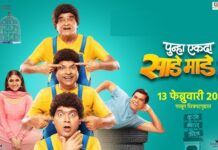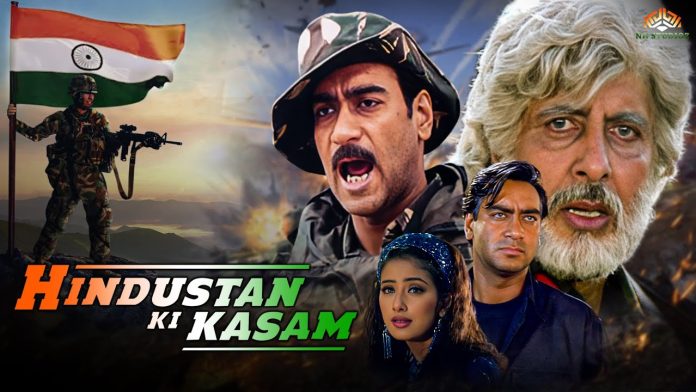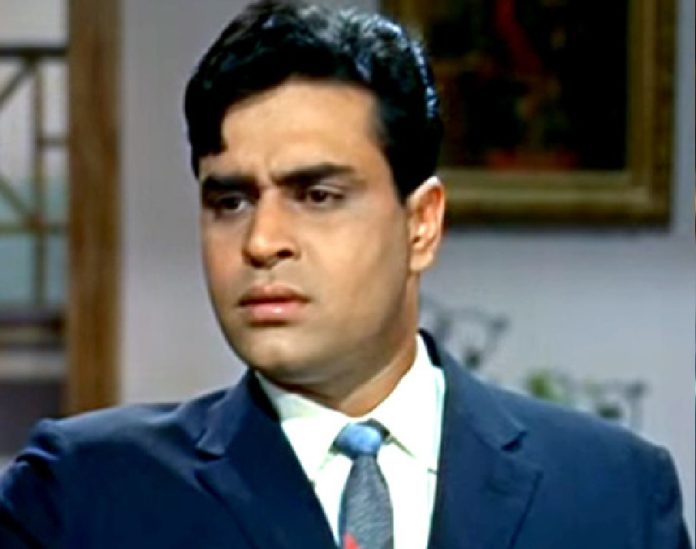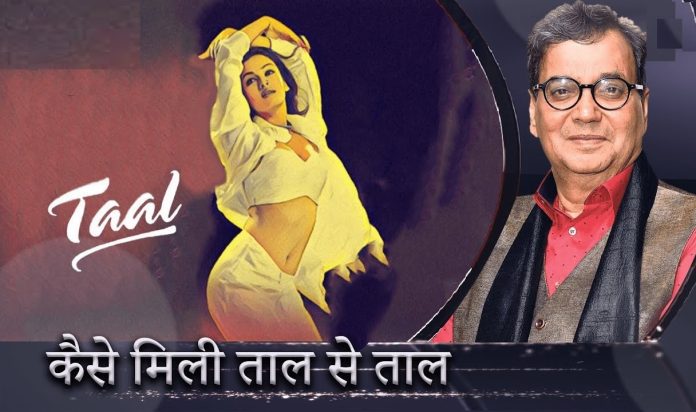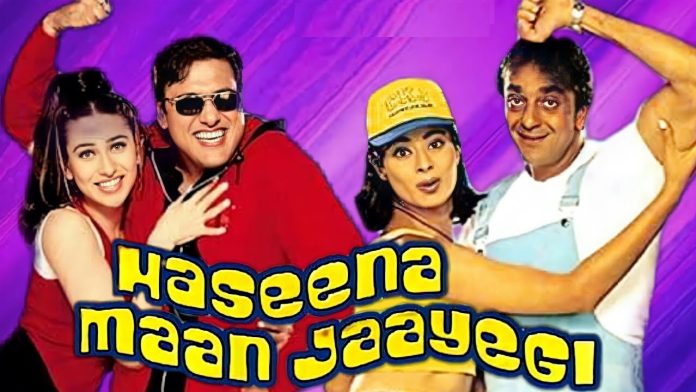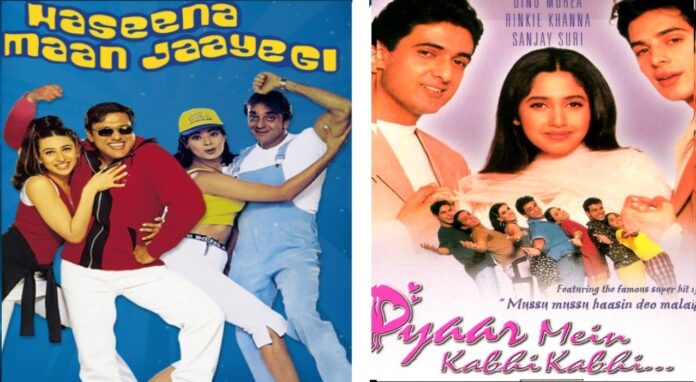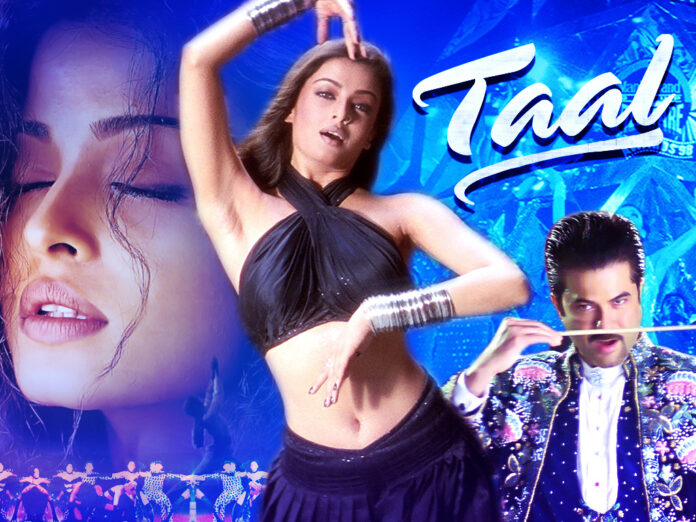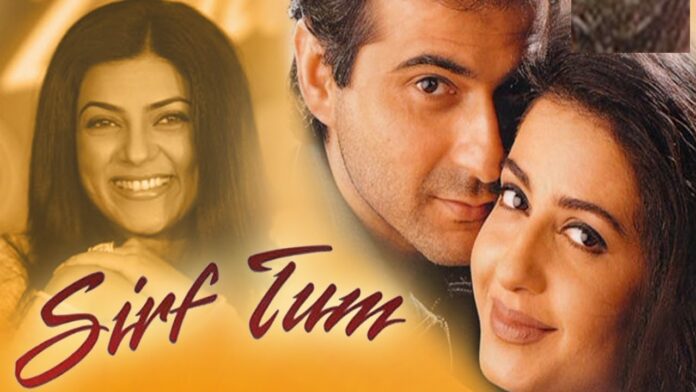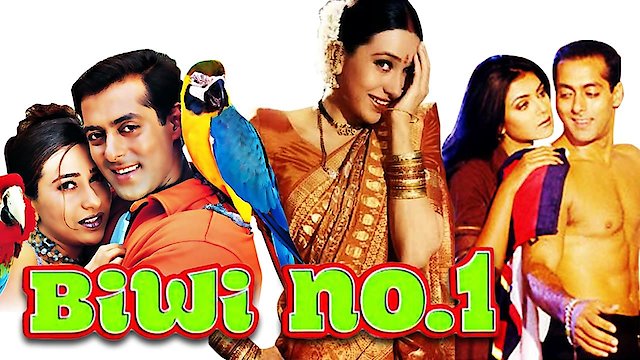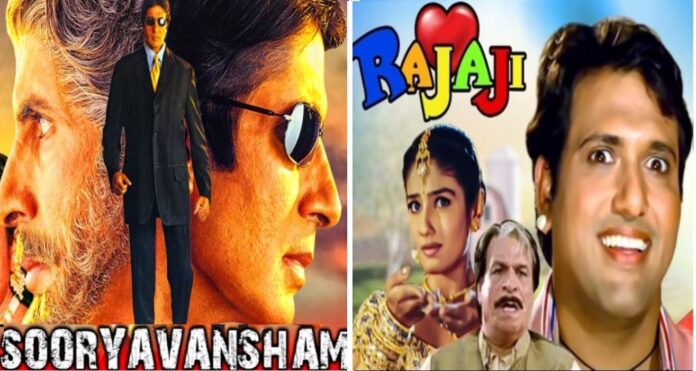HINDUSTAN KI KASAM
Devgans Films’ Hindustan Ki Kasam (UA) is a film which deals with the uneasy relations between India and Pakistan. The tension existing between the two countries is sought to be highlighted through the story of twin brothers who are separated in childhood. One brother grows up to become a writer in India, and the other dons the garb of a dreaded terrorist in Pakistan. The writer in India is endowed by nature with a quality which empowers him to dream of things that transpire in the life of his brother, thousands of miles away, even before he knows of his existence. He, therefore, writes novels about Indian armymen whose deaths are mysterious. In these novels, he reveals the circumstances which have led to their deaths because in all those cases, it has been his brother who has committed the crime. This arouses the suspicions of the Indian armymen who wrongly conclude that the writer is actually a terrorist. A retired army officer succeeds in establishing the writer’s innocence and the two of them together not only get the wayward Pakistani brother on the right track but also join hands with him to expose a conspiracy hatched by Pakistani terrorists to kill the Pakistani prime minister when he is on a goodwill mission to India.
The film actually has various tracks — the patriotic track which doesn’t really evoke patriotic feelings; the romantic tracks of the two brothers, which again lack in youthfulness or freshness; the track of fostering a feeling of brotherhood between the two countries, to identify a few. As a result, the drama often becomes hotch-potch. Little care has been taken of continuity and so the film appears jerky at times. The point of one twin brother dreaming of the deeds of the other may not be understood by all. Dialogues should have abounded in words of nationalistic flavour but such dialogues are few and hardly any of them are brilliant enough to deserve claps. Climax is too lengthy to be true. The portion of the climax in which Amitabh Bachchan goes on sermonising is irritating, to say the least. Further, the plea for brotherhood between inhabitants of the two nations may not find universal patronage in view of the recent animosity (Kargil).
Amitabh Bachchan suffers on account of a frivolous characterisation. He comes in and goes out of scenes from nowhere and his only job is to lecture. Although he performs well, the impatient audience of today will find it difficult to tolerate his sermonising. Ajay Devgan acts ably in a double role. He excels in stunts. Manisha Koirala looks disinterested. She impresses in her last scene and that’s about all. Sushmita Sen has a brief role and does a fair job. However, both the heroines need to improve their dress sense. Prem Chopra is quite good. Farida Jalal is natural but is getting repetitive. Gulshan Grover does a fine job. Kader Khan, Navin Nischol, Shakti Kapoor, Pramod Moutho, Salim Motu and Kashmira Shah lend average support. Shahbaaz Khan is effective. Mallika makes an average debut. The rest pass muster.
Veeru Devgan doesn’t impress as director half as much as he does as an action master. The script seems to have got too unwieldy for him to handle. Thrills (by Jai Singh) are excellent at places. The aerial stunts are exciting but the excitement wanes away after a while when realisation dawns upon the viewer that a lot of stunts are computer-generated also. Some special effects are good but some are rank shoddy. Music (Sukhwindara Singh) is a mixed bag. Jalwa tera jalwa is excellently-tuned but none of the other songs really stands out. In fact, so ordinary are most of the other songs that it would be in the film’s interest if they were shortened. Song picturisations (Raju Khan) could have been better. Sets (Bijon Dasgupta) are too loud and gaudy. Camerawork (Ishwar Bidri) is remarkable. Editing leaves a lot to be desired; reducing the film’s length by about 15 minutes can prove advantageous. Production values are grand.
On the whole, Hindustan Ki Kasam has hype and hoopla and, therefore, has taken a mind-blowing initial but once that dies down, the film will find it difficult to sustain at the box-office. Considering its high price, it will find the going tough except in Bihar and, perhaps, in circuits like East Punjab and parts of U.P., Maharashtra and Rajasthan. Exhibitors, who have paid fancy terms, will stand to lose even though a couple of distributors themselves may sail safe on the strength of the grand opening and the grander terms.
Released on 23-7-’99 at Novelty and 23 other cinemas of Bombay thru Devgan Entertainment & Software Ltd. Publicity & opening: extraordinary. …….Also released all over. Opening was historic everywhere.
LATEST POSITION
The sensational opening of HINDUSTAN KI KASAM this week has come as a shot in the arm.
Dada 1st week Bombay 13,49,559 (38.75%) from 10 cinemas; Ahmedabad 1,76,847 from 3 cinemas (3 cinemas unrecd.); Delhi 6,68,950 (39.38%) from 4 cinemas (3 on F.H.); Kanpur 1,44,353 from 2 cinemas, Agra 1,08,400; Calcutta 9,89,919 from 12 cinemas; Amravati (6 days) 86,826, Yavatmal (8 days) 94,140, Bilaspur 76,902; Bhopal 1,45,161 from 2 cinemas; Jaipur 1,88,915, Bikaner (gross) 2,15,030; Hyderabad (gross) 5,03,024 from 5 cinemas (1 in noon; 1 more in noon unrecd.).
Chudail No. 1 1st week Bombay 1,57,621 (33.31%) from 2 cinemas; Kanpur 60,374 from 2 cinemas.
Mann dropped further. It will entail heavy losses to its distributors. 2nd week Bombay 52,75,794 (81.03%) from 11 cinemas; Ahmedabad 14,88,155 from 4 cinemas, Krishna Padra, 1,29,674, Vapi 4,60,182, 1st Valsad 3,10,877, 2nd week Rajkot 1,93,865 from 2 cinemas (1 in matinee), Jamnagar 1,06,765 from 2 cinemas (1 in matinee); Kolhapur 1,73,718, Solapur 1,35,953; Delhi 45,37,666 from 11 cinemas (1 cinema was on F.H.); Kanpur 4,19,645 from 2 cinemas, Lucknow 4,69,174, Agra 2,56,481, Varanasi 2,04,505, Allahabad 1,19,190, Bareilly (6 days) 97,600 (1st 1,93,222), Dehradun 1,40,000, Hardwar 75,505, Saharanpur 1,26,000; Calcutta 22,62,098 from 18 cinemas; Nagpur 7,08,358 from 4 cinemas, Jabalpur (6 days) 1,38,591 (1st 2,17,787), Amravati (6 days) 1,63,284, Raipur (6 days, gross) 2,36,814 (1st week gross 3,89,561), Jalgaon (6 days) 1,38,475 (1st week 2,75,325), Chandrapur 1,09,377, Yavatmal 76,030 (1st 1,53,158); Indore 1,69,294, Bhopal 1,05,414 (1 cinema was on F.H.); Jaipur 4,16,484 from 2 cinemas, Bikaner 1,37,772, Udaipur 1,15,000 (1st 2,73,000); Hyderabad (gross) 12,44,265 from 6 cinemas (2 in noon); 2 weeks’ total from Vijayawada (gross) 5,10,205.
Benaam 3rd week Bombay 1,34,142 from 3 cinemas; Solapur (matinee) 11,381; 1st week Ghaziabad 1,06,734, 3rd Kanpur 56,743; 2nd week Nagpur 34,684, 1st week Raipur 50,198.
Haseena Maan Jaayegi 4th week Bombay 21,56,826 (70.62%) from 7 cinemas; Ahmedabad 54,000, Rajkot 55,740, Jamnagar (mat.) 7,338; Solapur 1,00,517 from 2 cinemas (1 in matinee); Delhi 20,11,426 from 8 cinemas (2 on F.H.); Kanpur 2,03,371 from 3 cinemas, Lucknow 2,03,028, Agra 1,56,938, Varanasi 1,08,939, Allahabad 87,500, Dehradun 87,066; Calcutta 1,91,197; Nagpur 1,06,922 from 2 cinemas, Jabalpur 58,904, Amravati 85,534, Raipur (gross) 99,714, Jalgaon 60,792, 1st week Gondia (gross) 1,33,012, Chandrapur 2,07,649, 4th week Bilaspur 58,732; Indore 95,663 (1 cinema was on F.H.), Bhopal 1,37,009 from 2 cinemas; Jaipur 3,18,343 from 2 cinemas; Hyderabad (gross) 7,31,993 from 5 cinemas (1 in noon).
Hum Dil De Chuke Sanam Bombay 5th week 47,18,206 (80.56%) from 11 cinemas; Ahmedabad 10,85,694 from 6 cinemas, Rajkot 1,34,104 from 2 cinemas (1 in matinee), Jamnagar 52,580, Bhuj 69,291, Adipur 85,478; Solapur 1,07,375 from 2 cinemas (1 cinema in 14 shows and 1 in matinee); Delhi 13,15,245 from 6 cinemas (1 cinema was on F.H.); Kanpur 1,80,364 from 2 cinemas, Lucknow 3,03,991, Agra 1,40,445, Varanasi 84,714, Allahabad 60,000, Bareilly (6 days) 36,578, Dehradun 74,094, Hardwar 20,000; Calcutta 4,94,808 from 4 cinemas; Nagpur 1,31,333 from 2 cinemas, 3rd week Jabalpur 2,02,219, 5th Amravati (6 days) 94,768, Raipur (6 days, gross) 1,40,085, 4th week Wardha (6 days) 30,942, 5th week Yavatmal (6 days) 34,942; Indore 2,02,895 from 2 cinemas, Bhopal 1,20,713; Jaipur 2,21,476; Hyderabad (gross) 8,45,769 from 5 cinemas (1 in noon shows and 2 on F.H.).
_____
Man Saayba Ni Mediye (Gujarati; tax-free) 1st week Ahmedabad 2,01,589 from 3 cinemas; affected due to heavy rains and curfew in parts of the city.
Senthi Nu Sindoor (Gujarati; tax-free) 1st week Ahmedabad 1,71,442 from 3 cinemas; affected due to rains and curfew.
Saadha Muqaddar (Punjabi; tax-free) has done average in Punjab in 1st week.
JATIN KANAKIA DEAD
Popular TV and stage actor Jatin Kanakia expired on 18th July at Lilavati Hospital in Bombay. He had been suffering from cancer. He was 46 and is survived by his wife and son.
Beginning his acting career on Gujarati stage nearly 20 years ago, Jatin Kanakia went on to make his mark in several popular TV serials like Shriman Shrimati, Kabhi Yeh Kabhi Woh and Maal Hai To Taal Hai. Do Aur Do Paanch (on Zee) and Hum Sab Ek Hain (on Sony) are two of his serials currently on air.
AAMIR KHAN RELEASES NASREEN MUNNI KABIR’S ‘TALKING FILMS’
Aamir Khan formally released Nasreen Munni Kabir’s new book, Talking Films, at a function hosted by its publishers, Oxford University Press (OUP), on 23rd July at Y.B. Chavan Centre, Bombay. The book consists of the author’s conversations with writer-poet-lyricist Javed Akhtar on Hindi cinema.
While releasing the book, Aamir Khan remarked, “Good books on Indian cinema are very much needed.” He also informed the gathering that even though he had read several books on Indian cinema, hardly any had impressed him. However, he was looking forward to reading Talking Films as Javed Akhtar was a very good writer and an intellectual, he added.
Shabana Azmi read out excerpts from three segments of the book viz. ‘Starting A Conversation’, ‘Dialogue’ and ‘Speciality of Indian Films’.
Addressing the gathering, Javed Akhtar revealed that he was reluctant, at first, to talk to Nasreen on the book, but relented after he was convinced about the author’s valuable thoughts on the subject.
Later, Nasreen Munni Kabir expressed her gratitude to Javed Akhtar for “his most valuable co-operation in bringing out Talking Films.”
OUP managing director Manzar Khan, who introduced Nasreen, Javed Akhtar and Aamir Khan to the gathering, explained that though OUP was a centuries-old publishing house and had started its publications in India at the beginning of this century, it had only recently begun commissioning books on Indian cinema. This was because Indian films had amply proved that they were a force to reckon with, he added.
The author, Nasreen Munni Kabir, has made a number of short films on Indian cinema and on some of its stars for UK’s Channel 4. Presently, she is a London-based independent film producer and director.
DO YOU KNOW?
* Most of the films these days have appendages like Cinemascope, 6-track sound, Dolby Stereo, DTS sound, Sensurround etc. But there is one film which boasts of an appendage of an ‘exclusive’ kind. The currently running Kannada hit, A.K. 47, proclaims itself (in its publicities) as ‘Kannada Scope Digital’, whatever that means or whatever scope it offers!
* The name Prakash has generally proved unlucky if the person with the name has been associated with film distribution in Bombay. No names need to be spelt out. An exception is Prakash Kokane of Shringar Films. The guy is moving from strength to strength.
* The audience at Kalpana Talkies, Kurla, Bombay, showered coins in the matinee show on the first day of HINDUSTAN KI KASAM during the song Jalwa tera jalwa!
* Police had to be called in to control the huge crowds in Satara at Krishna Talkies and Jayvijay Talkies on the opening day of HINDUSTAN KI KASAM!
* Police had to resort to lathi-charge in Patna and other stations of Bihar to control the surging crowds on the opening day of HINDUSTAN KI KASAM.
IN & OUT OF BOMBAY
Director Karan Johar, currently in New York, will first go to London and thereafter return to India (on 10th August).
Mr. Anil Thadani of Yash Raj Films, London-New York, will return to India in 7-10 days.
Producer Boney Kapoor will return from Madras in a day or two.
Delhi-U.P. distributor and exhibitor Brijesh Tandon will come to Bombay on 30th July.
Mr. Rajprakash Bansal of Jai Pictures P. Ltd., Jaipur, returned to Jaipur on 21st July.
INR Hire
INDUSTRY LOSES CASE IN SC
The Supreme Court has upheld the regulations under the Cinematograph Act by which cinemas are bound to show short educational/documentary films (Indian news reel) made by the Films Division, free of cost, as part of the licensing agreement. The court upheld the appeal filed by the Union government and the governments of West Bengal and Uttar Pradesh against the Delhi high court order quashing certain provisions under the Cinematograph Act and dismissed a writ petition of the Eastern India Motion Pictures Association, Calcutta, which had asserted that the regulations affected their right to freedom of speech. By this order of the SC, the statutory provision making it compulsory for cinemas in the country to screen educational and other documentaries prepared by the Films Division and also pay 1% of their nett weekly collections as rental to the Films Division has been upheld as valid.
According to a 1958 agreement between the FFI and the Films Division, the exhibitors have to pay one per cent of their nett weekly collections as rental for the short films, which they have to collect from the distribution centres. Screening of the short films was also made compulsory under the Cinematograph Rules.
The exhibitors challenged these rules, alleging that these regulations had affected their viewership and profits. They argued that they were facing tough competition from television, video and other audio-visual revolutions. Therefore, they could not spare time for the educational films nor pay for them. They also argued that as the government paid money to television channels for broadcasting these documentaries, the court should direct the government to do the same if the cinemas exhibited these documentaries.
The Supreme Court rejected their arguments. The judgement, delivered by a bench comprising Justice Sujata V. Manohar, Justice K. Venkataswami and Justice R.C. Lahoti, stated that there was no violation of the right to speech. When a significant part of the population is illiterate, it is important that every available means of communication, particularly audio-visual, be utilised to educate, inform and propagate scientific ideas. The best way to reach the large body of uneducated people is through the entertainment channel, the judgement said.
According to the court, instead of curtailing free speech, the provisions further it since they are intended to prepare a vast number of people for informed debate on important issues.
It also stated that the fees charged for the exhibition was nominal and only a small fraction of the cost incurred by the Films Division. Therefore, it was reasonable and did not infringe on the exhibitors’ right to trade. It was submitted by the government that Films Division was incurring heavy expenditure towards the production of about 125 films every year and took out about 400 prints of each film for distribution to over 13,000 cinemas across the country. The FD dubs the documentaries in 15 languages and retains about 50,000 prints at any given time, counsel for the government argued and added that FD incurred an expenditure of more than Rs. 12 crore per year for only taking out adequate prints while their recovery in the form of rentals is only Rs. 7 to 8 crore per year.
3-E
Education-Entertainment-Enlightenment
Heroes In New Territory
1999 may well go down in the history of Bollywood as a truly unusual year. For, at least four leading heroes and a heroine will have releases this year, which will get them into new territory — either producer or producer-director’s territory. Ajay Devgan’s Hindustan Ki Kasam has been released this week and although the official producer is Veeru Devgan, everyone knows how involved Ajay, too, has been in his maiden home production. Jackie Shroff’s Grahan is due for release later this year. Shah Rukh Khan and Juhi Chawla have stepped into production for the first time and are partners in Phir Bhi Dil Hai Hindustani which will hit the screens in November. The month of November will also see the release of Sunny Deol’s home production, Dillagi, with which he has also made his debut as a director. Of course, Salman Khan’s Hello Brother and Anil Kapoor’s Pukaar are also there but these aren’t their first releases. And yes, Aamir Khan will step into the territory of production by launching Lagaan this year.
Lucky Lady Lends Her Voice
Believe it or not but Kajol has dubbed for Taal. Kajol and Taal?!? It so happened that Kajol was at Audeus for the dubbing of her Dil Kya Kare when a voice was required for an announcement to be made in the pre-climax of Taal, also being dubbed then at Audeus. Subhash Ghai’s staff requested Kajol to lend her voice to the announcement, and the numero uno actress willingly obliged! And so, Taal will have the voice of Kajol though not her face. Which is the scene for which Kajol has dubbed? Try to figure out when you see the film.
Tid-Bits
And here are bits of non-film news. Since the news are connected to film personalities, they deserve mention in these columns.
– Like Rajinikanth has announced that he will not lend his support to any political party in the ensuing Lok Sabha elections. The Tamil film superstar had supported the DMK-TMC Combine in the ’96 elections and the front had won hands down, thanks to the Rajinikanth charisma.
– Like, a piqued Jayalalitha (AIADMK chief) has filed a suit in a Madras city civil court against former Tamil film actress Latha (who is affiliated to another political party). Latha had said in a recent public meeting that Jayalalitha, during her stay in New Delhi in April 1999, had beaten a bearer of a five-star hotel. Can you beat that?!
– And lastly, Span Aviation (Maharashtra), an airlines company which got grounded in May 1998 after suffering losses, is now hoping to stage a comeback with the help of a film personality. The airline has joined hands with Vinayak Mayekar, a trustee of V. Shantaram Foundation. It may be recalled that Span Aviation had begun operations in February ’95 with the support of former chief minister of Maharashtra, Manohar Joshi. The airline remained air-borne for a short span of three years. Happy soaring this time.
National Opposition
On Friday, July 23, while several cinemas in the country were screening Veeru Devgan’s Hindustan Ki Kasam, a film propagating national integration, it faced a national opposition in the last show, thanks to Doordarshan. DD telecast Chetan Anand’s Hindustan Ki Kasam that day. Very funny, kasam se!
Quote Of The Week
“Films cannot be made without money. And money alone cannot make a film.”
– Manoj Kumar



